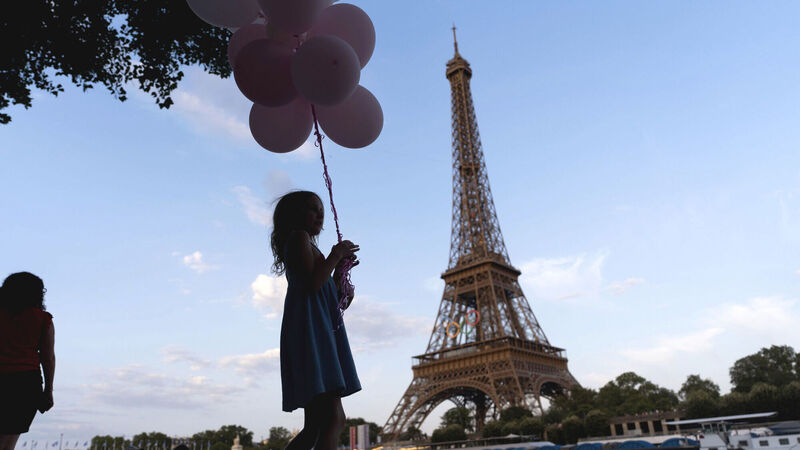How Paris 2024 transformed its iconic landmark into the perfect Olympics venue

Jenna Baltes, 8, of St. Paul, Minn., holds balloons while walking along the Seine river in front of the Eiffel Tower with her family. Pic: David Goldman, AP
At this particular venue, the star attraction is a permanent fixture. Since beach volleyball joined the Olympic programme in 1996 every host has strived for the perfect platform: Paris outdid them all.
London had Big Ben, Rio used the Copacabana beach, and Toyko incorporated a view of the Rainbow Bridge.
At the 2024 Games, they went bigger and better. A 13,000-seat stadium has been erected in front of the Eiffel Tower at Champ de Mars.
La Dame de Fer, or the Iron Lady, has understandably been heavily recruited for this entire occasion.
The opening ceremony is orientated around it, the Olympic rings are embedded on it, one of the game’s most popular sports will be played underneath it.
Outside is a sea of selfie sticks and craned necks. That in itself is not different within the seventh arrondissement. The new phenomenon sits closer to the foundation. Bypass a prominent security border that encircles the tower to find a boisterous outdoor bowl inside.
The venue and the sport’s festive atmosphere combine to create a desirable destination. A stream of celebrities, heads of state and royalty have passed by and snapped a selfie.
It is not just about the Instagram either. This Olympics has sought to construct venues with a memorable live experience. Tickets for medal competitions are eye-wateringly expensive but the arenas maximise the live spectacle once you get there.
Take equestrian events, which are taking place in the stunning gardens of Versailles. At the Rugby sevens in the Stade de France, the conversation around TMO reviews are played out for the entire ground to examine.
At the spectacular La Défense Arena where Daniel Wiffen and Mona McSharry climbed the podium, live commentary of the race is broadcast in English and French. The boxing venue doesn’t simply try and generate an atmosphere, they actively incentivise it.
At various points during afternoon or night sessions, the big screens show a decibel measure. The target is to drive it to a peak sound above 120.
Beach volleyball is primed for such innovation. There are several reasons for the sport’s developing popularity. All of that can be boiled down to one fundamental element: raucous fun. This place effectively ensures it.
Sports reports are all too fond of settling for an imprecise verb to illustrate atmosphere. Insert, ‘shaking.’ This, however, is what the Eiffel Tower Stadium literally does. Two DJs positioned court-side beckon supporters to rock their hands up and down. As they do, the newly-constructed bleachers truly do shift beneath our feet.
The screens attempt to educate the many bandwagoners in attendance, particularly those in the press gantry. Successful shots are illustrated with graphics. Each spike, block or bump is clearly labelled.
On Wednesday morning, Latvia overcame Paraguay to earn their first win in Paris.
Technology’s strengthening grip of global sporting officiating is obvious too as a block touch challenge in the second set is helpfully explained in detail while replays roll to determine a verdict.
The Eiffel Tower stadium will host blind football events later this month. French competitors have suggested they will be able to calm their nerves during contests by turning to the landmark as a reminder of what they are playing for.
It is obvious and only right that the athletes enjoy it. What should not be overlooked is that spectators do too.
At times, it can seem like the worst place to watch the Olympics is at the event itself.
The crowds are massive, it is a strain on even the most effective of transport systems, the price of a sandwich or coffee only exacerbates the upscale cost of tickets.
There are several showpiece events running at the same time, the only guaranteed method of consuming all of it is in front of the television.
Despite all of that, sport still desperately needs spectators.
Not just because of the financial injection they provide. Every ground here has been a testament to their underlying value.
It is a mutually beneficial relationship; one helps the other.
Paris is an awesome marriage of sight and sound, sporting theatre with a prized background and enhancing soundtrack.
Emotion is an intrinsic factor at the Olympic games. Plenty of that is authentic and pure. Some of it, like the venues, is immaculately well-staged.
Olympic costs can crush hosts. Paris 2024 vowed they would have a cheaper showpiece.
They minimised extra construction and allowed the games to adapt to the city rather than the other way round. In doing so they found a formula that future Olympics, as well as the wider world of sport, can learn from.













